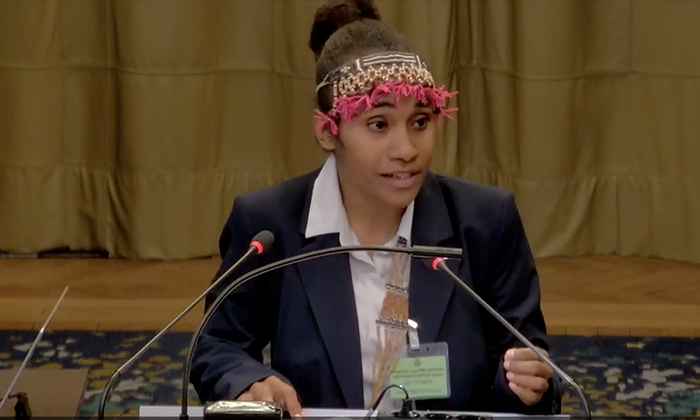'The biggest climate case in human history' is a fact thanks to... students!
2 December 2024

Vanuatu, a small country of some 80 islands northeast of Australia with a population of just over 330,000, is at great risk of becoming uninhabitable as early as the middle of this century if the world does not act quickly to halt climate change, and with it, sea level rise. That is why Vanuatu took up the students' initiative and, along with a large coalition of other countries, got the United Nations General Assembly to take this climate case to the International Court of Justice.
The original group of eight students has since grown into the organization Pacific Islands Students Fighting Climate Change (PISFCC), and their president, Cynthia Houniuhi, was allowed to speak on the first morning of the trial. She said: ‘Without our land, our bodies and memories are severed from the fundamental relationship that define who we are.’ She also said she and other young people had looked to the Paris agreement as an instrument of hope when it was passed in 2015 but it had since been ‘hijacked’ by fossil fuel interests.
Hope for damage repair and stopping illegal behavior
Both Cynthia and Margaretha Wewerinke-Singh call this case at the International Court of Justice the greatest court case in human history. Margaretha Wewerinke-Singh is not only an associate professor of sustainability law at the UvA and co-founder of SEVEN, the climate institute of the UvA, but also an advisor to the government of Vanuatu and lead council and advocate for Vanuatu and the Melanesian Spearhead Group.
She says the uniqueness of this case lies in the fact that an ICJ opinion has significance for the entire world and can influence all other, local climate cases. In an interview with the Volkskrant, Margaretha says, ‘I hope that the outcome of this case is that those causing climate change must stop their illegal behaviour immediately. No more oil and gas drilling can then be done in countries that have already emitted a lot of greenhouse gases, such as Norway. They will also have to repair the damage already done.’
In her plea before the International Court of Justice on the morning of Dec. 2, the first day of trial, Margaretha said: ‘The cardinal principle is crystal clear: responsible states are required to make full reparation for the injury they have caused. How is this given effect in this case? In our submission responsibility for reparations can and must be proportionate to the historic contributions to the harm.’
What do the experts expect from this climate case?
This climate case is not a proceeding in which states are indicted. It is a so-called Advisory Procedure, in which the United Nations General Assembly asks the International Court of Justice to explain the responsibility that states have regarding climate change.
University Professor of International Law and Sustainability André Nollkaemper: “This is an extremely important procedure. There is much difference of opinion between states as to whether, and especially at what pace, they are obliged to reduce greenhouse gas emissions. Many states see this primarily as a political question where they have to negotiate further steps within the framework of the Paris Agreement.
What Vanuatu is asking the Court to do is to establish that there are numerous international obligations separate from the Paris Agreement to protect other states, their populations and nature from the impacts of climate change. If the Court will make that determination, which I do expect, it will be able to provide significant impetus to the now mostly political process.
Want to follow this climate case (2-13 December) online?
The hearings are streamed live via the International Court of Justice website or watch the recordings here.